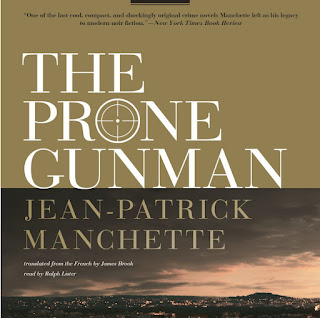The Gunman
This was one of those impulsive purchases that come from a quick search of the crime fiction section of a local bookshop. The Gunman, published earlier as The Prone Guman, is back in the shops thanks to what sounds like a fairly poor film version, starring Sean Penn, and premised (rather incorrectly) on a good man who has become a hired killer and straightened out, only to be forced to return for one last job due to circumstances beyond his control. Jean-Patrick Machette’s novel has no such redemptive character, although there is something more to the novel that the action-plot which fires it forwards.
The novel’s assassin does “want out” but the powers-that-be
don’t want to let him go, and betray him to a mafia family whose son he has
taken out, some years back. Violence begets violence. The pay-masters are
rather sinister, government agencies, with the suggestion of the Cold War
behind the scenes (and largely out of sight). Rather than developing the
political machinations in the manner of Le Carre’s A Spy Who Came in from the Cold, however, Machette perhaps has
other allusions in mind. In particular, Martin Terrier has ‘Gatsby’ like
characteristics. He has left behind his small town, his derelict (and just
diseased) drunken father, and gone out in search of his fortune, albeit in an
unconventional way. Once he has achieved his goal, his intention is to return
to his town and the girl he had met years before, who like Daisy – has promised
Terrier/Gatsby to wait ten years for his return. At some point, she has lost
patience and married an arrogant man of her own class, whose treatment of
distain for Terrier is one of those touches that leads the reader to empathise with
this most ruthless-killer. Here’s Félix, Terrier’s rival, stirring him up after
Terrier has missed an allusion to Robert Altman:
‘What do you think of
Régis Debray’s position on the media and the intellectual? What do you think of
the new French crime novel? And do you think that jazz can still progress?’
(p.57).
Another innovation on the killer/crime novel is the psychological
element, portrayed through a lack of insight into self (conveyed
cleverly through manipulation of point of view) beyond survival, as well as the
state of sexual impotence of the killer-protagonist who is clearly a more
competent fighter than lover, despite the presence of the blonde-lover, naked
at various points and frustrated with her rough boyfriend. At one point,
Terrier also loses his ability to speak, or he acts as such, literally becoming
voiceless in his pursuit of action over words.
I read this book in a matter of hours, and enjoyed it. It’s
not brilliant literature, perhaps, but it does enough – a French noir crime
novel, quite conscious of the genre (referenced, as above) – and defying some
of the stereotypes of the action-novel at the same time. The Gunman shoots from the hip, even if the film misfires.




Comments
Post a Comment